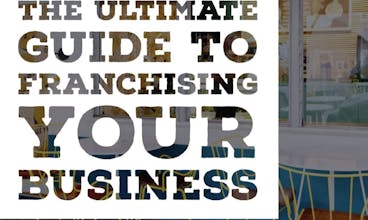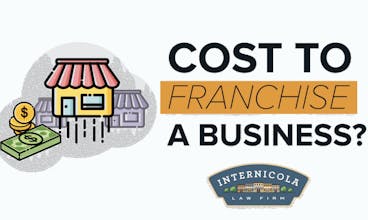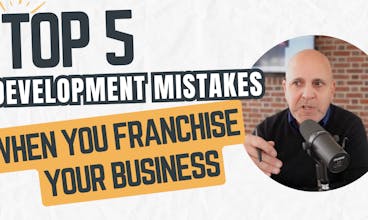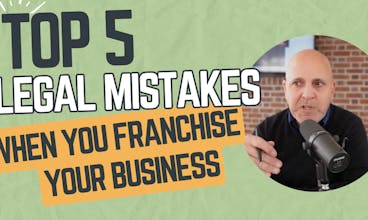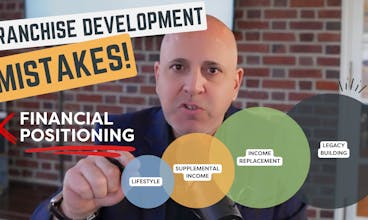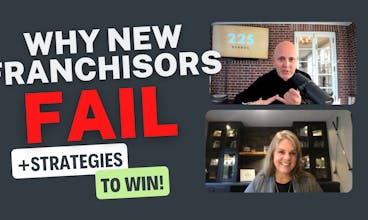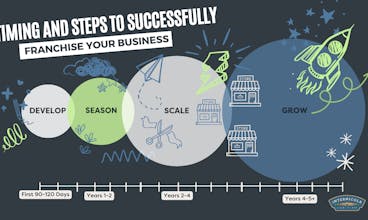Are You Ready to Franchise Your Business?
Beyond profitability, how do you know if you're ready to franchise your business and whether or not franchising is a good fit for you and the future of your business? When making this decision, evaluate these four core factors to determine if franchising is or can be a good fit:
- Unit Economics - The financial performance of your business, including profitability and ROI potential for future franchisees.
- Industry - The industry that you operate in and the level of existing competition within the franchise marketplace.
- Scalability - Your ability to train and support future franchisees so that they can replicate your business model.
- Founder Mindset and Goals - Whether or not franchising aligns with your long-term growth goals.
Unit Economics
When you franchise your business and start selling franchises, your primary task and obligation is to make your future franchisees profitable and ensure that their economic expectations align with the franchise opportunity that you have sold to them. Different businesses offer different investment levels and income potential and when evaluating the unit economics of your business, factors that should be considered, include:
1. Investment Level - The amount of capital that a future franchisee will be required to invest in establishing and opening a new franchise location. Investment levels vary home-based businesses that require lower start-costs, to brick and mortar retail businesses and restaurants that require significant capital investments.
2. Income Potential - Based on the current financial performance of your business, i.e., gross sales, cost of goods sold, gross profits, expenses, and cash flow, what income potential will you business offer to future franchisees? What will be the potential cash flow they will experience and, when considering investment levels, what is ROI potential that they may experience?
3. Opportunity Profile - What economic role will your franchise serve in the lives of your future franchisees i.e., will your franchise be positioned as a lower cost / lower investment level opportunity focused on franchisee lifestyle and supplemental income or, will your franchise be positioned as a higher cost / higher investment level opportunity focused on replacing a franchisees income and helping them build a legacy?
When evaluating unit economics and the current performance of your business, consider, that, at least initially, your franchisees may not be as profitable as you. Your franchisees will have higher expenses that include royalties and other fees that they will be paying to you as franchisor and they will be in the start-up phase of developing new locations.
Industry
The industry that you operate in is a critical factor for evaluation. Are you operating in a industry that is well established with significant competition in the franchise marketplace or are you operating in a new industry, a sub-set of an industry with white space, or a well established industry that presents great opportunity and is underrepresented in the franchise marketplace?
Your industry evaluation should be focused on the franchise marketplace. When 5 Guys started franchising in 2002, very few believed the world needed a new burger chain. But it did! Evaluate what the franchise marketplace looks like today. If you franchise your business, what does your franchise competition look like? If it's competitive, it doesn't mean that you shouldn't franchise your business but that you need to prepare for a different journey and focus intently on differentiating your brand and the strategy and approach that you apply to franchising. Also, is there white space in the industry with little competition where you're essentially creating a new market? If so, being one of the first to market is critical. Understanding what is going on in the industry is critical.
Scalability
Related to your unit economic analysis, scalability relates to your ability to help franchisees consistently replicate and duplicate the operations of your business. Consistency is critical and the more complex the business, the greater your focus should bo on whether or not your business model is scalable as a franchise. Consider that many successful franchise systems didn't start off on day 1 with the systems, support, and supply chain that they have today. The key is to not grow beyond your capacity to support your current franchisees and, over time, to keep improving the systems, support, and supply chain that you offer franchisees.
Founder Mindset and Goals
Franchising must align with your personal and business goals. The most successful franchise systems were created by founders and entrepreneurs who, on day 1, didn't know franchising but, as they franchised their business and after they became a franchisor and started selling franchises, applied a mindset of continuous learning and continuously improving their franchise system, what they offered franchisees, and how they supported franchisees.
Franchise success takes time. While becoming a franchisor and going from where you are today to becoming a franchisor and having a franchise offering in place, takes approximately 90 to 120 days, franchise success requires long-term thinking and a 5 year growth strategy. After you become a franchisor it will be critical to season your franchise offering - to sell franchises to well qualified franchisees and to then support and over-support them as you continuously build and improve your training, support, and the operations of your franchisees. Once you make you initial group of pioneering franchisees successful, then the next step is to hit the accelerator and start scaling and growing more.
Consider that when you franchise your business you're entering a new industry and building out a new business. The good news is that you can do this organically and while you run your business but provided that a 5 year growth strategy and dedication to continuously improving your franchise system aligns with your business and personal goals.

